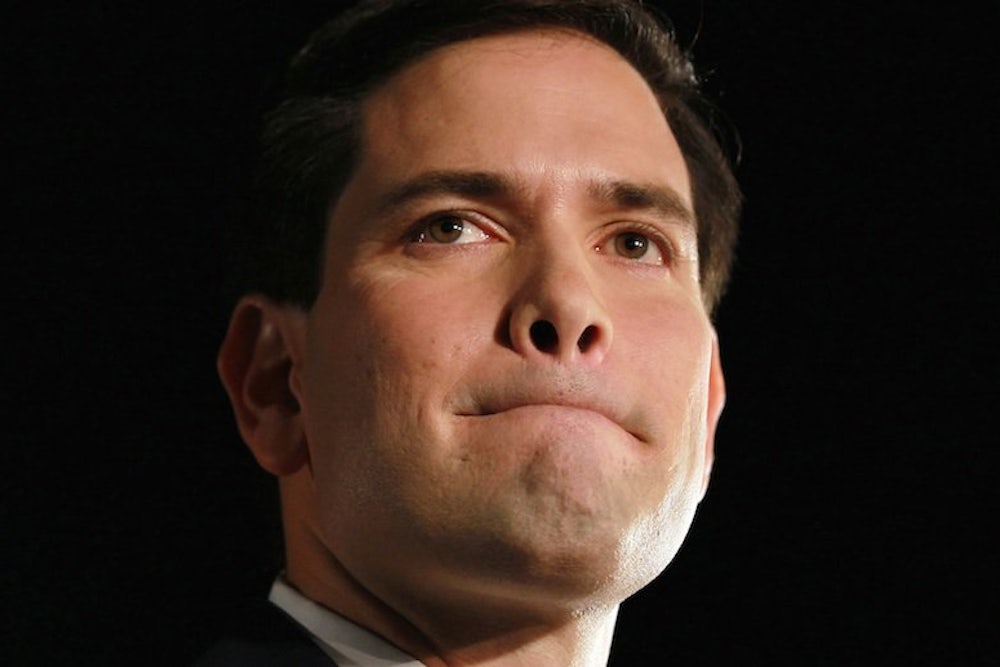Marco Rubio's role as the Republican point man on immigration reform is remarkable if you think of the senator who played the part before him. John McCain had been in the Senate for nearly twenty years when he took up the issue in President Bush's second term; Rubio has been in Washington only a little more than two. Of course, Rubio has something McCain lacked: credibility with the GOP’s right-wing base. And so Rubio is seen as the key to forming the bipartisan coalition that has eluded those who have worked on this issue. Politico reported Tuesday that the fear that Rubio might bolt from negotiations "has been driving the closed-door action on immigration during the week since the Senate left town."
On Sunday, just before Senator Chuck Schumer went on "Meet the Press" to talk up the progress on immigration reform, Rubio released a statement warning that "reports that the bipartisan group of eight senators have agreed on a legislative proposal are premature." Rubio demanded a long, open process to passing immigration reform, with committee hearings and the chance to offer amendments—something Democratic leaders are promising to do. It wasn't the first time he's panicked Washington by threatening to withdraw his support. In February, Rubio's office complained that the White House wasn't working with Congress on immigration reform—no matter that the White House recalled five meetings with staffers from the Gang of Eight—Rubio got a prompt call from the president reaffirming his commitment to the cause. This was after Rubio called leaked details of an unfinished administration proposal similar to his own "dead on arrival."
This could be an effort to assure conservatives that he wasn't about to be rolled by the Democrats; it could be another empty case of Rubio "setting himself up to claim credit for winning concessions that no one opposed in the first place," as Benjy Sarlin at TPM puts it. It also demonstrates Rubio's extreme caution, the care he pays to each of the many constituencies he's courted during his career. And I think it should make comprehensive immigration reform supporters very skeptical of the likelihood that he will stick around and send this bill to President Obama's desk.
In late February, I went down to South Florida to learn about Rubio's relationship with his political mentor (and possible 2016 presidential rival), Jeb Bush. What I learned, from talking to state representatives and local county commissioners—the low-level politicians that make up a state party's infrastructure—gave lie to his image as an overnight Tea Party sensation. Rubio was assiduously deferential to local party officials, asking for their support and careful not to move forward without their help, whether it was in his first run for county commissioner in West Miami or his policy platform as speaker of the state house in Tallahassee. He employed a similar method in his campaign and first years in office, reaching out to, courting, and channeling the energy and enthusiasm of various outside groups: religious conservatives, Tea Party types, the blogeratti, Hispanic Republicans, and so on. He did this while generating positive headlines describing him as the young newbie who was keeping his nose to the books, brushing up on policy and learning the ways of the Senate, rather than stirring things up. "His power is in the blogosphere and on Twitter and in evangelical circles and activist corners, not in the building where he works, but because the building where he works is so cognizant of those power structures it elevates his status within the building. It's a pretty impressive accomplishment," said Manuel Roig-Franzia, who wrote the definitive account of the senator's career so far, The Rise of Marco Rubio.
That's not universally seen as a positive. I didn't get into it much in my piece, but as McKay Coppins noted in his fun take on the South Florida Republican community, even some of Rubio's political allies down there have been frustrated that so far his great stores of political goodwill haven't been put to much use. And getting Republicans on board for this bill is going to require a willingness to take big risks. It's going to expend a lot of political capital, and will almost certainly mean making enemies among members of his own party (see, for example, Texas Senator Ted Cruz, also a Cuban-American GOP Senator, who says he has "deep concerns" about the deal now and is unlikely to support it in the future.) Rubio's past political behavior doesn't suggest he'd be the type to take the plunge on this, especially with all of the untold opportunities for right-wing radio to turn a small but very vocal minority against reform.
Of course, he's only been in office for 27 months—that's plenty of time still for him to surprise us—but this line from Politico's report should give immigration-reform hopefuls serious pause: "Either way, in the end, Rubio's view has evolved from believing that he needed passage in order to be able to display a substantive accomplishment, to believing he will get credit for trying so aggressively." In other words, it's a lot easier to walk away, basically unscathed, and portray himself as the reasonable guy who genuinely wanted reform but couldn't negotiate with the unreasonable Democrats, than it is to stick around and actually get the bill done.
